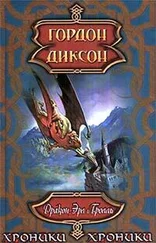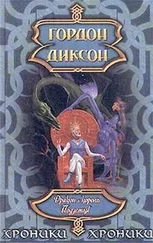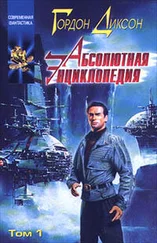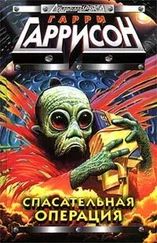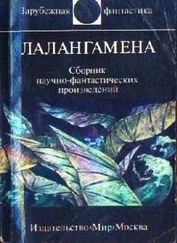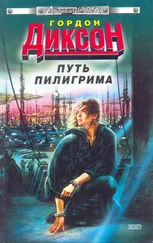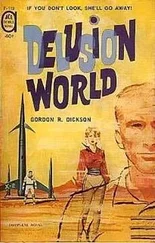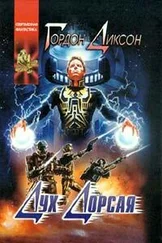“Send it to the Friendly compound,” I said. “I’ll take the Credentials case.”
I took it up from the conveyor belt and turned to walk off. The man standing in a dispatcher’s uniform by the first groundcar in line did fit the description.
“Name, sir?” he said. “Business on St. Marie?”
If he had been described to me, I must have been described to him. But I was prepared to humor him.
“Newsman Tam Olyn,” I said. “Old Earth resident and Interstellar News Services Guild Representative. I’m here to cover the Friendly-Exotic conflict.” I opened my case and gave him my papers.
“Fine, Mr. Olyn.” He handed them back to me, damp from the rain. He turned away to open the door of the car beside him and set the automatic pilot. “Follow the highway straight to Joseph’s Town. Put it on automatic at the city limits and the car’ll take you to the Friendly compound.”
“All right,” I said. “Just a minute.”
He turned back. He had a young, good-looking face with a little mustache and he looked at me with a bright blankness. “Sir?”
“Help me get in the car.”
“Oh, I’m sorry, sir.” He came quickly over to me. “I didn’t realize your leg—”
“Damp stiffens it,” I said. He adjusted the seat and I got my left leg in behind the steering column. He started to turn away.
“Wait a minute,” I said again. I was out of patience. “You’re Walter Imera, aren’t you?”
“Yes, sir,” he said softly.
“Look at me,” I said. “You’ve got some information for me, haven’t you?” ‘ He turned slowly back to face me. His face was still blank.
“No”, sir.”
I waited a long moment, looking at him.
“Ail right,” I said then, reaching for the car door. “I guess you know I’ll get the information anyway. And they’ll believe you told me.”
His little mustache began to look like it was painted on.
“Wait,” he said. “You’ve got to understand. Information like that’s not part of your news, is it? I’ve got a family—”
“And I haven’t,” I said. I felt nothing for him.
“But you don’t understand. They’d kill me. That’s the sort of organization the Blue Front is now, here on St. Marie. What d’you want to know about them for? I didn’t understand you meant—”
“All right,” I said. I reached for the car door.
“Wait.” He held out a hand to me in the rain. “How do I know you can make them leave me alone if I tell you?”
“They may be back in power here someday,” I said. “Not even outlawed political groups want to antagonize the Interstellar News Services.” I started to close the door once more.
“All right,” he said quickly. “All right. You go to New San Marcos. The Wallace Street Jewelers there. It’s just beyond Joseph’s Town, where the Friendly compound is you’re going to.” He licked his lips. “You’ll tell them about me?”
“I’ll tell them.” I looked at him. Above the edge of the blue uniform collar on the right side of his neck I could see an inch or two of fine silver chain, bright against winter-pale skin. The crucifix attached to it would be down under his shirt. “The Friendly soldiers have been here two years now. How do people like them?”
He grinned a little. His color was coming back.
“Oh, like anybody,” he said. “You just have to understand them. They’ve got their own ways.”
I felt the ache in my stiff leg where the doctors on New Earth had taken the needle from the spring-rifle out of it three years before.
“Yes, they have,” I said. “Shut the door.”
He shut it. I drove off.
There was some religious medal on the car’s instrument panel. One of the Friendly soldiers would have ripped it off and thrown it away, or refused the car. And so it gave me a particular pleasure to leave it where it was, though it meant no more to me than it would to him. It was not just because of Dave and the other prisoners they had shot down on New Earth. It was simply because there are some duties that have a small element of pleasure. After the illusions of childhood are gone and there is nothing left but duties, such pleasures are welcome. Fanatics, when all is said and done, are no worse than mad dogs.
But mad dogs have to be destroyed; it is simple common sense.
And you return to common sense after a while in life, inevitably. When the wild dreams of justice and progress are all dead and buried, when the painful beatings of feeling inside you are finally stilled, then it becomes best to be still, unliving, and unyielding as—the blade of a sword sharpened on a stone. The rain through which such a blade is carried to its using does not stain it, any more than the blood in which it is bathed at last. Rain and blood are alike to sharpened iron.
I drove for half an hour past wooded hills and plowed meadows. The furrows of the fields were black in the rain. I thought it a kinder black than some other shades I had seen. At last I reached the outskirts of Joseph’s Town.
The autopilot of the car threaded me through a small, neat, typical St. Marie city of about a hundred thousand people. We came out on the far side into a cleared area, beyond which lifted the massive, sloping concrete walls of a military compound.
A Friendly noncom stopped my car at the gate with his black spring-rifle and opened the car door at my left.
“Thou hast business here?”
His voice was harsh and high in his nose. The cloth tabs of a Groupman edged his collar. Above them his forty-year-old face was lean and graven with lines. Both face and hands, the only uncovered parts of him, looked unnaturally white against the black cloth and rifle.
I opened the case beside me and handed him my papers.
“My Credentials,” I said. “I’m here to see your acting Commander of Expeditionary Forces, Commandant Jamethon Black.”
“Move over, then,” he said nasally. “I must drive thee.”
I moved.
He got in and took the stick. We drove through the gate and turned down an approach alley. I could see an interior square at the alley’s far end. The close
concrete walls on either side of us echoed the sound of our passage as we went. I heard drill commands growing louder as we approached the square. When we rolled out into it, soldiers were drawn up in ranks for their midday service, in the rain.
The Groupman left me and went in the entrance of what seemed to be an office set in the wall on one side of the square. I looked over the soldiers standing in formation. They stood at present-arms, their position of worship under field conditions; and as I watched, the officer facing them, with his back to a wall, led them into the words of their Battle Hymn.
Soldier, ask not—now or ever,
Where to war your banners go.
Anarch’s legions all surround us.
Strike! And do not count the blow!
I sat trying not to listen. There was no musical accompaniment, no religious furniture or symbols except the thin shape of the cross whitewashed on the gray wall behind the officer. The massed male voices rose and fell slowly in the dark, sad hymn that promised them only pain, and suffering, and sorrow. At last, the final line mourned its harsh prayer for a battle death, and they ordered arms.
A Groupman dismissed the ranks as the officer walked past my car without looking at me, and passed in through the entrance where my noncommissioned guide had disappeared. As he passed I saw the officer was Jamethon.
A moment later the guide came for me. Limping a little on my stiffened leg, I followed him to an inner room with the lights on above a single desk.
Jamethon rose and nodded as the door closed behind me. He wore the faded tabs of a Commandant on his uniform lapels.
Читать дальше
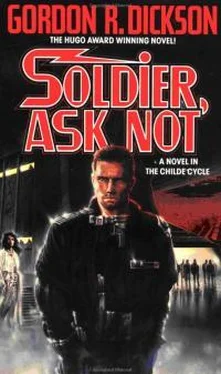
![Гордон Диксон - Некромант [Некромансер; Нет места человеку]](/books/4913/gordon-dikson-nekromant-nekromanser-net-mesta-che-thumb.webp)
